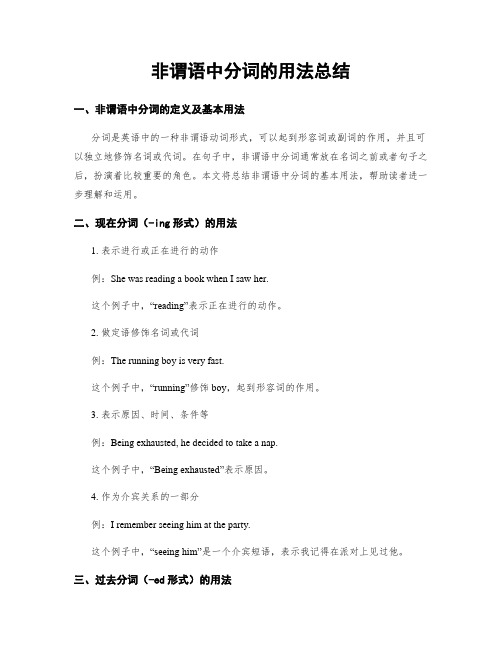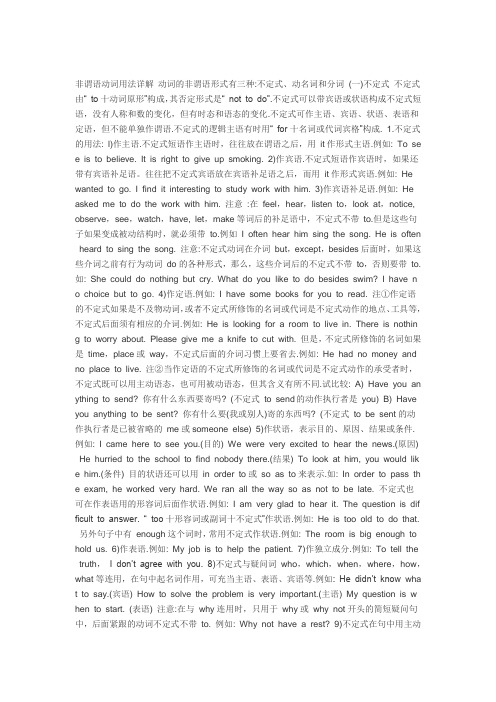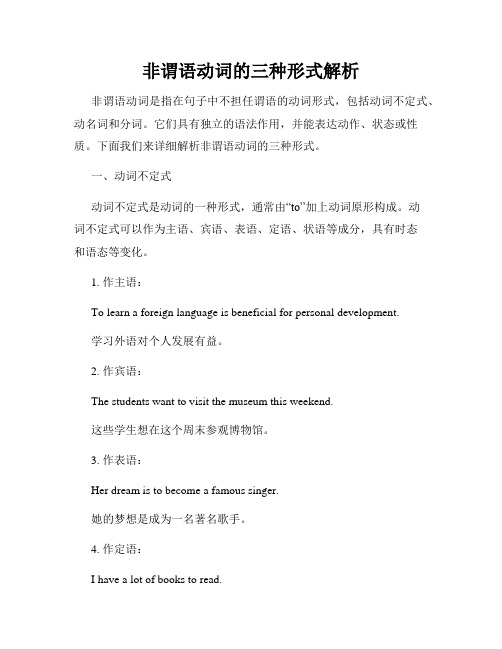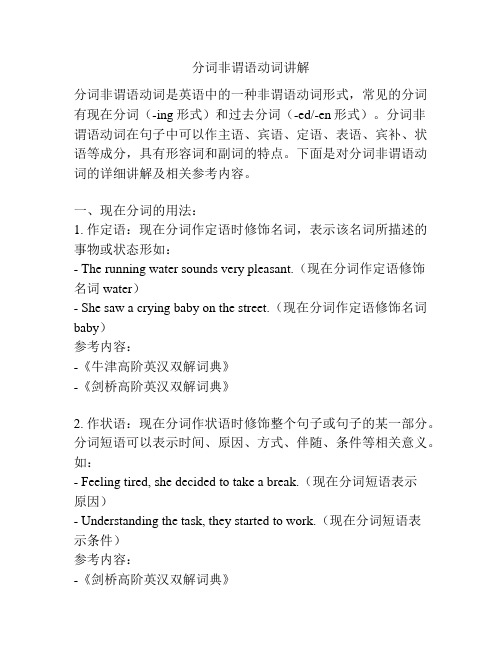非谓语动词讲解(三)------分词
非谓语动词的三种形式及用法区别

非谓语动词的三种形式及用法区别一、非谓语动词的三种形式:1. 动词-ing形式:动词-ing形式具有动名词的功能,一般用来表示一个正在进行或发生的动作,以及被动含义,等。
比如:He was observed walking along the street. 他被观察到沿着街道走。
2. 动词不定式形式:动词不定式具有名词、形容词和动词的功能,常用来表示目的、动机、结果、条件、时间、让步等。
比如:To face the danger bravely is his duty. 勇敢的去面对危险是他的责任。
3. 动词的过去分词形式:动词的过去分词常用来表示完成或发生过的动作或状态,以及主句的谓语动词的被动的形式,常用结构有:Be + done/past participle (被动),Have/Get + done(完成).比如:The machine is now ready to be used. 这台机器现在准备好被使用了。
二、非谓语动词的用法区别:1. 动词-ing形式:(1) 用作定语:形容词性短语作定语修饰名词或代词,如:He was aman working hard. 他是个努力工作的人。
(2) 用作表语:Ing 形式的短语作表语,表示一个正在进行的动作或状态,如:His job is repairing the machine. 他的工作是修理机器。
2. 动词不定式形式:(1) 作宾补:动词不定式作宾补表示“目的”,“动机”,“结果”,“条件”,“时间”,“让步”等。
如:He came here to do something for us. 他来这里为我们做一些事情。
(2) 作状语:动词不定式作状语,表示“目的”,“动机”,“条件”,“时间”,“让步”等。
如:She always goes out for a walk to relax herself. 她总是出去散步来放松自己。
2023年人教版英语九年级中考复习语法之非谓语动词(动名词、分词)讲义

人教版英语九年级复习之非谓语动词(动名词、分词)非谓语动词是指在句中充当除谓语以外的其他句子成分的动词形式,可作主语、宾语、表语、定语、状语、补足语等,在句中起名词、形容词、副词的作用。
非谓语动词包含三种形式:动词不定式、动名词和分词(现在分词和过去分词)。
考点一:动名词动名词,即动词-ing形式动词的-ing形式由“动词原形+-ing”构成,其否定形式为“not+动词的-ing形式”。
动词的-ing形式在句中可以作主语、宾语、表语、定语、宾语补足语等。
1、作主语动名词作主语,谓语动词用单数,大多数情况下可以和不定式互换Watching TV too much is a waste of time. = To watch TV too much is a waste of time.看电视太久是在浪费时间。
典型例题:1._________ an English club ______ a good way to improve English.A.Joining; isB. Join; areC. To join; isD. Joins; are2. ________ lots of vegetables ________ good for our health.A. Eating; isB. Eat; areC. To eat; isD. Eats; are参考答案:1.A 2. A2、作宾语。
(1).在初中阶段我们需要掌握的后跟动词-ing形式作宾语的词语有dislike, consider, enjoy, finish, imagine, keep, mind, practice, suggest, give up, put off, keep on, be busy, have fun, be afraid of, be good at, be interested in, be \get used to, look forward to, feel like, thanks for等。
非谓语中分词的用法总结

非谓语中分词的用法总结一、非谓语中分词的定义及基本用法分词是英语中的一种非谓语动词形式,可以起到形容词或副词的作用,并且可以独立地修饰名词或代词。
在句子中,非谓语中分词通常放在名词之前或者句子之后,扮演着比较重要的角色。
本文将总结非谓语中分词的基本用法,帮助读者进一步理解和运用。
二、现在分词(-ing形式)的用法1. 表示进行或正在进行的动作例:She was reading a book when I saw her.这个例子中,“reading”表示正在进行的动作。
2. 做定语修饰名词或代词例:The running boy is very fast.这个例子中,“running”修饰boy,起到形容词的作用。
3. 表示原因、时间、条件等例:Being exhausted, he decided to take a nap.这个例子中,“Being exhausted”表示原因。
4. 作为介宾关系的一部分例:I remember seeing him at the party.这个例子中,“seeing him”是一个介宾短语,表示我记得在派对上见过他。
三、过去分词(-ed形式)的用法1. 表示被动意义例:The window was broken by a stray ball.这个例子中,“broken”表示被动的意义。
2. 做定语修饰名词或代词例:I have lost my keys.这个例子中,“lost”修饰keys,起到形容词的作用。
3. 表示完成或完成的结果例:The report has been submitted.这个例子中,“submitted”表示完成了某个动作。
4. 作为介宾关系的一部分例:We had a lot of fun playing games at the party.这个例子中,“playing games”是一个介宾短语,表示我们在派对上玩游戏时度过了很多乐趣。
非谓语动词-分词

4. Being used by me now, the bike can’t be lent to you.
(由于)正在被我使用, 这辆自行车不能借给你。
Being struck by the heavy storm, they felt helpless. (因为)正被猛烈的暴风雨袭击,他们感到很无助。
Ⅱ 分词的用法
一.作表语
1. 过去分词作表语,表示主语所处的状态
The window is broken. 窗户破了。 The train is crowded. 火车很拥挤。 She is excited. 她很激动。
2. 现在分词表示主语的特征或属性,通常物作主语, “令人...”
过去分词表示主语的状态,通常人作主语, “感到...”
a drowning man 快要淹死的 a drowned man 已经淹死的
falling leaves fallen leaves
正在飘落的树叶 落叶
2. 分词作后置定语
分词 doing
分词和被修饰的名词 的主被关系
主动关系
being done
被动关系
分词在时间上的意义
表示正在进行或 习惯性动作
完成式
(not ) having (not ) having been
done
done
过去分词: 一般只有一种形式:done
Ⅰ 分词的时态和语态
一. 现在分词的时态变化:
1) 现在分词的一般式:
表示动作与谓语动词同时发生,或几乎同 时发生。
当(他)正在路上走的时候,他发现了一支钢笔。
Walking along the street, he found a pen. (同时发生 )
非谓语动词用法详解 动词的非谓语形式有三种

非谓语动词用法详解动词的非谓语形式有三种:不定式、动名词和分词(一)不定式不定式由“ to十动词原形”构成,其否定形式是“ not to do”.不定式可以带宾语或状语构成不定式短语,没有人称和数的变化,但有时态和语态的变化.不定式可作主语、宾语、状语、表语和定语,但不能单独作谓语.不定式的逻辑主语有时用“ for十名词或代词宾格”构成. 1.不定式的用法: l)作主语.不定式短语作主语时,往往放在谓语之后,用it作形式主语.例如: To se e is to believe. It is right to give up smoking. 2)作宾语.不定式短语作宾语时,如果还带有宾语补足语。
往往把不定式宾语放在宾语补足语之后,而用it作形式宾语.例如: He wanted to go. I find it interesting to study work with him. 3)作宾语补足语.例如: He asked me to do the work with him. 注意:在feel,hear,listen to,look at,notice, observe,see,watch,have, let,make等词后的补足语中,不定式不带to.但是这些句子如果变成被动结构时,就必须带to.例如I often hear him sing the song. He is often heard to sing the song. 注意:不定式动词在介词but,except,besides后面时,如果这些介词之前有行为动词do的各种形式,那么,这些介词后的不定式不带to,否则要带to.如: She could do nothing but cry. What do you like to do besides swim? I have n o choice but to go. 4)作定语.例如: I have some books for you to read. 注①作定语的不定式如果是不及物动词,或者不定式所修饰的名词或代词是不定式动作的地点、工具等,不定式后面须有相应的介词.例如: He is looking for a room to live in. There is nothin g to worry about. Please give me a knife to cut with. 但是,不定式所修饰的名词如果是time,place或way,不定式后面的介词习惯上要省去.例如: He had no money and no place to live. 注②当作定语的不定式所修饰的名词或代词是不定式动作的承受者时,不定式既可以用主动语态,也可用被动语态,但其含义有所不同.试比较: A) Have you an ything to send? 你有什么东西要寄吗? (不定式to send的动作执行者是you) B) Have you anything to be sent? 你有什么要(我或别人)寄的东西吗? (不定式to be sent的动作执行者是已被省略的me或someone else) 5)作状语,表示目的、原因、结果或条件.例如: I came here to see you.(目的) We were very excited to hear the news.(原因) He hurried to the school to find nobody there.(结果) To look at him, you would lik e him.(条件) 目的状语还可以用in order to或so as to来表示.如: In order to pass th e exam, he worked very hard. We ran all the way so as not to be late. 不定式也可在作表语用的形容词后面作状语.例如: I am very glad to hear it. The question is dif ficult to answer. “ too十形容词或副词十不定式”作状语.例如: He is too old to do that.另外句子中有enough这个词时,常用不定式作状语.例如: The room is big enough to hold us. 6)作表语.例如: My job is to help the patient. 7)作独立成分.例如: To tell the truth,I don’t agree with you. 8)不定式与疑问词who,which,when,where,how,what等连用,在句中起名词作用,可充当主语、表语、宾语等.例如: He didn’t know wha t to say.(宾语) How to solve the problem is very important.(主语) My question is w hen to start. (表语) 注意:在与why连用时,只用于why或why not开头的简短疑问句中,后面紧跟的动词不定式不带to. 例如: Why not have a rest? 9)不定式在句中用主动式还是被动式。
非谓语动词的三种形式解析

非谓语动词的三种形式解析非谓语动词是指在句子中不担任谓语的动词形式,包括动词不定式、动名词和分词。
它们具有独立的语法作用,并能表达动作、状态或性质。
下面我们来详细解析非谓语动词的三种形式。
一、动词不定式动词不定式是动词的一种形式,通常由“to”加上动词原形构成。
动词不定式可以作为主语、宾语、表语、定语、状语等成分,具有时态和语态等变化。
1. 作主语:To learn a foreign language is beneficial for personal development.学习外语对个人发展有益。
2. 作宾语:The students want to visit the museum this weekend.这些学生想在这个周末参观博物馆。
3. 作表语:Her dream is to become a famous singer.她的梦想是成为一名著名歌手。
4. 作定语:I have a lot of books to read.我有很多书要读。
5. 作状语:He works hard to achieve his goals.他努力工作以实现他的目标。
二、动名词动名词是动词加上-ing构成的名词形式,具有名词的特点,可以担任主语、宾语、定语、表语等成分。
1. 作主语:Swimming is her favorite sport.游泳是她最喜欢的运动。
2. 作宾语:I enjoy playing the piano in my spare time.我喜欢在闲暇时间弹钢琴。
3. 作定语:The running water sounds very soothing.流水的声音听起来很舒缓。
4. 作表语:His hobby is collecting stamps.他的爱好是集邮。
三、分词分词是动词的一种形式,在句中可以作定语、状语等成分,常见的分词形式有现在分词(-ing形式)和过去分词(-ed、-en等形式)。
分词非谓语动词讲解

分词非谓语动词讲解分词非谓语动词是英语中的一种非谓语动词形式,常见的分词有现在分词(-ing形式)和过去分词(-ed/-en形式)。
分词非谓语动词在句子中可以作主语、宾语、定语、表语、宾补、状语等成分,具有形容词和副词的特点。
下面是对分词非谓语动词的详细讲解及相关参考内容。
一、现在分词的用法:1. 作定语:现在分词作定语时修饰名词,表示该名词所描述的事物或状态形如:- The running water sounds very pleasant.(现在分词作定语修饰名词water)- She saw a crying baby on the street.(现在分词作定语修饰名词baby)参考内容:-《牛津高阶英汉双解词典》-《剑桥高阶英汉双解词典》2. 作状语:现在分词作状语时修饰整个句子或句子的某一部分。
分词短语可以表示时间、原因、方式、伴随、条件等相关意义。
如:- Feeling tired, she decided to take a break.(现在分词短语表示原因)- Understanding the task, they started to work.(现在分词短语表示条件)参考内容:-《剑桥高阶英汉双解词典》-《英汉大词典》二、过去分词的用法:1. 作定语:过去分词在句中作定语时,修饰名词,表示该名词被动、完成或被描述的状态,如:- The broken vase needs to be repaired.(过去分词作定语修饰名词vase)- The information provided is accurate.(过去分词作定语修饰名词information)参考内容:-《朗文当代高级英语辞典》-《剑桥国际英语高级词典》2. 作表语:过去分词可以作表语,表示主语的状态或特征,如:- He is interested in the books written by the famous author.(过去分词作表语修饰主语)- The glass is broken.(过去分词作表语修饰主语)参考内容:-《剑桥高阶英汉双解词典》-《牛津高阶英汉双解词典》三、分词作宾补的用法:分词非谓语动词可以作及物动词的宾语补足语,表示被动、完成的意义,如:- She found the door locked.(分词作宾补修饰宾语door)- They heard the news announced on the radio.(分词作宾补修饰宾语news)参考内容:-《韦氏英语用法词典》-《剑桥高阶英汉双解词典》综上所述,分词非谓语动词的用法主要包括现在分词作定语、状语,过去分词作定语、表语和宾补等。
非谓语动词分词的用法总结

非谓语动词分词的用法总结一、非谓语动词分词的基本概念及形式非谓语动词分词是英语中的一种特殊用法,常用来表达被动、完成、主动等不同含义。
在句子中作为定语、状语或补语,并且有时可以替代从句。
它的形式通常为“过去分词”或“现在分词”,具体使用取决于上下文和句子结构。
1. 过去分词过去分词通常由动词原形后加上-ed或-d构成,如:played, taken, finished等。
它可以表示被动意义,也可以表示稍微延续的状态或完成的行为。
2. 现在分词现在分词通常由动词原形后加-ing构成,如:playing, taking, working等。
它可以表示主动进行的行为,同时也具有形容词性质。
二、非谓语动词分词作定语非谓语动词分词可以用作定语来修饰名词,起到进一步说明、限定名次的作用。
1. 过去分词作定语过去分词作为定语时,通常修饰被其所描述的名次,如:broken heart (破碎的心) ,cooked rice (煮熟的米饭)等。
它可以表示被动或完成的状态。
2. 现在分词作定语现在分词作为定语时,通常修饰与之相关的名次,并且描述正在进行或主动发生的行为,如:a running river (奔流的河流) ,a barking dog (叫唤的狗)等。
三、非谓语动词分词作状语非谓语动词分词可以用作状语来修饰句子、从句或名词短语,起到表示时间、原因、方式、条件等不同功能的作用。
1. 过去分词作状语过去分词作为状语时,可以表示原因、结果、条件、时间等。
例如:Having finished his homework, he went out to play. (完成了家庭作业后,他出去玩了)2. 现在分词作状语现在分词作为状语时,可以表达同时进行、原因、方式等含义。
例如:Walking slowly, she enjoyed the beautiful scenery. (慢慢地走着,她欣赏美丽的风景)四、非谓语动词分词作补语非谓语动词分词还可以用来充当及物动词的宾补或形容词的补足语,起到补充说明、进一步描述的作用。
- 1、下载文档前请自行甄别文档内容的完整性,平台不提供额外的编辑、内容补充、找答案等附加服务。
- 2、"仅部分预览"的文档,不可在线预览部分如存在完整性等问题,可反馈申请退款(可完整预览的文档不适用该条件!)。
- 3、如文档侵犯您的权益,请联系客服反馈,我们会尽快为您处理(人工客服工作时间:9:00-18:30)。
非谓语动词系列(三)……分词 名词 doing ( done > being done )表示状态多用 doingThe lake lying on the west of Hangzhou is called the West Lake.Which lies分词和修饰的名词有主谓关系用doingThe boy talking with my mother is my son.who is talking分词和修饰的名词有动宾关系用doneMany people die from the polluted air.the air which is polluted 分词和修饰的名词有动宾关系,且有正在.进行用being doneThe boy being invitedto her parly now is her boyfriend.who is being invitedDoing (现在分词)…一主动.正在Done (过去分词)・…一被动、完成falling leavesx fallen leaves . criticized boy> being criticized boy the boy telling a lie 、the boy invited to lhe meeting心理活动的过去分词作定语(不表被动) (Surprise 、exciteinterestx puzzle 、please 、frightenx lire 、disappointsencourage) The puzzled look on his face makes us surprised.His excited smile made us happy.用分词和定语从句两种形式填空:Tliere was a wallet ___________ ________________ (lie ) one the ground. An man__________________ 或 __________ (ride) a horse came from the front. Tlie lady _______________ 或 __________ (take) with your teacher is a nurse.The lake ________________ 或 ___________ (lie ) on the west of Hang Zhou is called the west lake. Mr smith once hired a young worker ____________________ 或 ___________ (call) John ・ Tlie book. ______________ 或 ___________ (complete 完成)in May, sells well. This is a _______________ 或 __________ (develop 发达 )area.Tliey took the ________________ 或 ___________ (wound 受伤)soldiers into a small temple at once. Tlie Chinese people are _________________________ 或 _______________ (hard —work 勤劳) The ____________________ 或 _______________ (man -make) satellite will move round the earth ・ I found a _____________________ 或 _____________ (break) cup on ll)e table.Any person _________________________ 或 _____________ ( disagree) must write down his name on the paper. Most of people _____________________ 或 ______________ (sing) were students. Here was no Frenchman __________________________ 或 ___________ (speak) English . The room temperature ____________________________ 或 _________ (need) is 15 "C. The method 方法 __________ (use) is efficient.Her __________________________ (disappoint) laugh came out at once.The train just now ____________ (arrive) at Platform No.4 is from Beijing ・The student _ ( criticize 批评)is in Class One tomorrow. Tlie student ( criticize 批评)is in Class One now.区别2) x改错①She told me why lo not come in time②I can let you to have one ticket.③1( made the girl who was standing at the gate to feel better.④We'll have the boy to post this letter.⑤Was the thief noticed leave the house?⑥He made the girl light a fire for us.⑦He made some fish food to feed the dog.⑧The girl was made learn English song・⑨ A student began to make faces make the other students laugh.⑩Who left the water run all the time?(ll)The good news sent him fly home ・(IZ)we found them read in the classroom.写出不同的动词形式①We saw you _________ (fight) on the side of the birds just now.②They found him ___________ (die) at the foot of the hill.◎ Her father found her________________ (injure 受伤)in her arm.④It s Lifang who had it _______________ (do).⑤The teacher tried lo make himself ______________ ( understand)⑥They sent me _____________ (read) the book.⑦We watched the ship __________________ ( steam 开动)past.⑧We caught the visitor _____________ (tell) a lie.⑨He couldn't make his voice _____________ (hear)about the noise of the traffic.⑩we must get everything ____________ (move 运转)。
⑪ I can't have you ____________ (do) nothing all day.⑫ Did you noticed his hand _____________ ( shake 摇动)?I ・ The young lady stood ________ tor a moment when she saw a beggar before he suddenly.A, surprising B. to surprise C. surprised D. having surprised 2.•一• How did you find your visit lo the museum ?I thoroughly enjoyed it, It was ___________ .A. far more interesting B ・ even much interested C, so more interesting D, a lot much interested3. Tliey thought their bodies would be __________ kept in the pyramids.A. well b. quiteC very D. much4. The play was so ____________ that nearly everybodywas _to 【ears (眼泪). A. moving . movingB. moved, movedC. moving. movedD. moved, moving5. With his son ___________ ・ the man felt angry.A. disappointingB. disappointedC. being disappointedD. disappoint 6. “ you are too _________ said the _____________ mother to his son.A. disappointingdisappointedB. disappointed> disappointed C ・ disappointed 、disappointing 改错: The puzzling look on his face suggested that he should understand the question. The surprising look showed that he hadn't expected this. Then came her exciting scream of joy.分词做状语用 $ doing 、done 、being done 、having done> having been done^分词在句首分词在句末填写下列各词:________ (feel) tired. the teacher lay on the ground ・ (be) blind . how could they see an elephant. Not ______ (receive) an answer, he decided to write another letter. _____ ( born )into a poor family, he had only two years of schooling ・(lire) with the work, she sat down to rest.___ (wound) in the leg. The soldier had lo lie in bed. (not satisfy) with the result, we decided to make the experiment again. _ ( discourage), I started lo leave the place.①②③④⑤⑥⑦⑧___ (see) from the hill, the city looks beautiful.________ (walk) along the sands towards his car, he saw a stranger. Be careful when (cross) the street.Hiswife died in 1980. ___________ (leave) him with three children.___ (give) more lime, we are sure to finish il ・ (support) by the people . we succeeded at Iasi. The bus was held up by the snow slornr ______________ ( cause) the delay (延期). Theboy jumped up and down. ____________________ (cry) with joy. __ ( hold) his head high, he walked past the pole.Thetrain started at five, ______________ ( arrive) at qingyuan al 12.Hemust be able to use the foreign language, _________________ (forget) all about his own.Reading the letter, tears came to his eyes.Looking at from the lop of the hill, our town looks even more beautiful. Seeing his hometown. a sense of pride came to his mind ・ Being very hot, they went swimming in the rivenWalking through the park. a wonderful smell of flowers came to our nose.. Tliey sei off at four, and arriving home an hour later. Done his homework ・ the boy went out to play.Having written his composition, so he began to watch TV. Tlie boy being dressed in red coat is my son. I don't know the boy was born in 1986.The spoken English countries are developed couniry in the world . his accent .he must be form the south ・③ Given more money , and we will buy the dictionary.④Having not heard from him for a long tnne, I don't know how he is getting on with his work.⑨⑩⑪⑫⑬⑭⑮⑯⑰⑱⑲⑳错 改①②③④⑤⑥⑦⑧⑨⑩⑪⑫分词时态综合练习:1 ・He was knocked down by a car _________________ (run) in the street.2.He showed us around the house __________________ (build) there now.3.There is a tree ___________ (stand) in front of our house・4.____________ (do) his work he went home ・5.____________ ( criticize 批评)by the teacher, he felt very unhappy.6._______________ ( write ) his composition. he began lo do his maths homework・7.____________ (not know) what to do next, he went to his teacher for adviee.8.____________ (be) a student, you should study hard.9.____________ (be) there many limes. I know the place very well.11, _____________ (see) the film many tunes, he didn't go to see it last night.13,___________________ (tell) many times, he still couldn't remember it.14,___________ ( stand) on lop of the mountain, you can see the village more clearly.15,This is the problem ___________________ (discuss) at yesterday s meeting.17.______________ ( heat), water can be lunied into gases.18.______________ (see) from the top of the hill, the town looks even more beautiful.20.The old man stood here, ____________ (support) by his daughter.21.He sat there. ________________ (lose) in thoughl.22.___________ ( praise 表扬)by the teacher at the meeting, he felt very happy.24.He hurried home. ________________ (look) behind him as he went.25.___________ (arrive) at the airport, I was told that my flight had taken oil26.___________ (hear) the news, we jumped with joy.27.The question _________________ ( discuss) is of great importance・2& ________________ (mvite) to speak. I *11 start making some preparation tomorrow.分词综合练习(测验.毎题3分) 〜1.They sent the ______________ man lo the hospital at once・A/ dead B. died C. dying D. being dead2.When I pul my hand on his chesl. I could feel his heart still _______ .A/ beat B. beating C. beaten D. to beat3.Most of the people ______ to the parly were famous scientists・A/ invited B/ to invite C/ being invited D/ inviting4.The next morning she found the mail _________ in bed .dead・A/ lying B/lie C/ lay D/ laying5.We were all so pleased to see the trees__________ so well.A/ grow C. grown B /growing D/ having grown6.--- Good morning, can I help you ? ——I'd like l have his package _____________A. be weighed B/ to be weighed C/ to weight D/ weighed7._____ more attention , the trees could have frown better.fiJ Given B/ To give C/ Giving D/ Having given8.The murderer was brought in. with his bands ___________ behind his back.A/ being tied B/ having tied C/ to be lied D/ lied9._________ a reply, he decided to write again.A/ Not receiving B. Receiving not C. Not having received D. having not received 10,Never have I seen the word _________ this way.A. useB. using C, used D, to be used11.The child stood on the sands. ______ in wonder at his first sight of the sea.A. losingB. lostC. to be lostD. having lost12.What he said made us deeply _____________ ・A/ move B. moving C. moved D. be moved13.What's die language _________ in Gerinany ?A. to speakB. spoken C, speaking D, to be spoken14,The students are kept busy _________ for the term examination.A/ to prepare B. to be preparing C/ preparing D. prepare15,Looking through the window. I found him _______________ in a sofa・A/ to seat b/ seat c/ seating D. seated16,Seeing water __________ out of the broken pipe Jie stopped to repair it.A/ bursting B /burst C. being burst D .having been burst17.1 have only w\two dollars ________ in my pockets.A/ remaining B. remained C, remain D. io be remained18.The man stood there, his sharp eyes _________ on my face.A/ fix B. being fixed C, fixed D. fixing19.The viclory sent the soldiers' spirits ________A. risen b/ rising C. raising D. raised20 Bob was the only one I *d have ____________ with me ・A. to work B, working C. worked D, him work21.Playing with the fire, the boy gol his trousers _______ .A. bum B ・burning C, burnt D. being burnt22.You’re having a fever. Your head feels__________ hot.A. burntB. burningC. bumD. being burnt23.He told me he'd lost his job. which was something I ________________ tor.A. Was not preparingB. had not preparedC. Was not prepared D/ has not prepared24.Don’t worry. Il's quite safe skating on the _____ lake.A. freezing B, frozen C. freeze D. having frozen25.・-Why have you been so quiet? ---- His words have left me ___________ ・A/ think B, to think C, thinking D. thought26.Once ______ alone , the girl started crying again.A. leavingB. left C, being left D. having left27.Who is the girl _______ in red ?A. dressingB. wearingC. dressedD. worn28. _______ a good lesson・ the boy never dared to make trouble again.A. TeachingB. TaughtC. Having taughtD. Having been taught29.The bus rolled into the valley. _______ t en deaths and more wounded・A/ to cause B. caused C causing D, having caused30.Generally ______ , English is not difficult to earn.A. speakingB. to speak C ,spoken D. speak31.Tlie letter arrived a week later than _______A. expectedB. being expected C, expecting D. to be expected32.All things ________ , your plan is practical.A. consideringB. being considered C, considered D. (o be considered33.The boy was scolded because he was caught _____________ apples from the neighbor's tree.A/ lo pick B. having picked C, pick D. picking。
